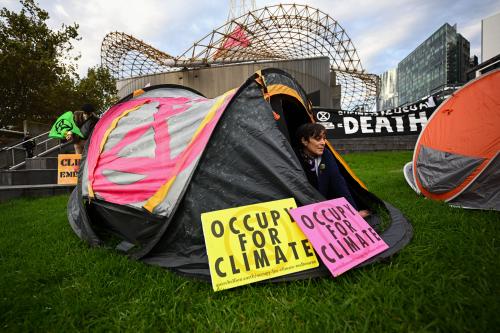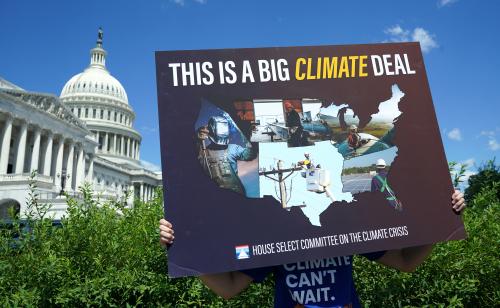Editor’s note: On Friday, Brookings published the fourth installment of its Paris Climate Conference series, featuring Philip Wallach. Along with the audio, the text of his remarks is reproduced here.
Hello, I’m Philip Wallach of the Governance Studies Program and Center for Effective Public Management here at Brookings. Several of my colleagues who have long experience studying climate negotiations have given big-picture looks at what the Paris climate talks are intended to accomplish, and what they’re likely to accomplish. What I want to do is give a comparatively parochial view by thinking in terms of U.S. domestic policymaking, which is my area of expertise. Looking across the Atlantic from the banks of the Potomac tends to make me somewhat more skeptical about the prospects for success, or at least to focus more on the challenges that will have to be overcome.
That’s because our country’s policymaking process has historically not led us to take international leadership on the climate issue. Why not? Well, many people might summarize the issue as: Republicans. The Republican Party denies the reality of global climate change, which means it is going to obstruct any costly efforts to mitigate it through emissions reduction. That’s obviously a big obstacle, but I’d say it’s often overstated. Republicans have supported in the past and could support in the future plenty of policies that would line up with their other priorities and would productively get at global climate change, maybe all the way up to a carbon tax if it could be included as part of a pro-growth tax reform package. The GOP doesn’t necessarily need to have a moment of truth in which they decisively repudiate all of the dubious assertions about the non-existence of anthropogenic global climate change to become productive players. Yes, as long as Jim Inhofe, the cantankerous senior Senator from Oklahoma remains the Chairman of the Environment and Public Works Committee, it is hard to see Republicans executing a turn, but there are already murmurs of a new direction at various levels of the party.
More generally, I’d say America’s problem is: Congress. Remember, even when Democrats controlled both chambers and the White House back in 2009 and 2010, they couldn’t find their way to putting in place an overarching climate policy, and it’s hard to make the case that Republican obstructionism was the crucial barrier. Back in 1997, the Senate voted 95-0 for a resolution disavowing any intention to ratify the Kyoto Protocol if it would impose significant and binding costs on the U.S. So Congress as a body has neither provided well-targeted climate legislation nor has it shown much willingness to concede any American sovereignty to an enforceable international climate treaty. And Congress has control over a number of constitutional levers that are hard to imagine working around: the power of the purse, the Senate’s ratification of treaties, and of course the power to craft new legislation.
Considering the magnitude of the Congress problem, it is actually remarkable how much the Obama administration has been able to do to address greenhouse gas emissions. The main way they’ve done that is by teaching an old law a new trick: with the blessing, or at least the acquiescence, of the Supreme Court, the Environmental Protection Agency has interpreted the Clean Air Act to support far-reaching regulation of carbon emissions from automobiles (now a done deal); trucks and airplanes (now in progress); and power plants. That last one, in the form of the Clean Power Plan, is the centerpiece of American climate policy headed to Paris. Using the Clean Air Act—and therefore proceeding without any new congressional help—the EPA will superintend a system of state-by-state emission reduction plans. That plan will have teeth from 2022-2030, but its formal finalization this past October was followed by a bevy of lawsuits, not to mention angry political rhetoric from governors around the state. Some of the legal and political complaints are facile, but many of them have some real merit, and so they are going to hang over the Clean Power Plan like a dark cloud for at least the next couple of years—as will the possibility that the 2016 election will produce a Republican President determined to reverse the EPA’s progress one way or another.
The Obama administration has by and large put those concerns out of mind, proceeding under the assumption that the Clean Power Plan will stick (or perhaps, in the alternative, that they should get as much leverage out of it as possible before it gets knocked out). It is the single largest component in the country’s promises in Paris, and negotiators convey unshakable confidence in America’s willingness and ability to follow through on it. All this while various Republican legislators, including Senate Majority Leader Mitch McConnell, have addressed foreign leaders with the message that Congress is not on board with the Obama administration’s plans.
What are the implications of having U.S. political leaders courting open conflict even as the country ostensibly makes a decades-long commitment? This American conflict is shaping the whole architecture of the Paris agreement, because the core of the negotiated structure must be able to function without U.S. Senate approval unlikely to be forthcoming. But President Obama has said that he thinks some parts of the agreement will need to be binding—and it isn’t yet clear how he will square that with circumventing the Senate. Senator Inhofe, for one, is not going to go quietly; he issued a declaration stating that “The U.S. Senate will not be ignored. If the president wishes to sign the American people up to a legally binding agreement, the deal must go through the Senate. There is no way around it.” On the key issue of providing direct financial support for developing countries’ investments in renewable energy, it is hard to see how Congress could be cut out of the process. Somehow, America will have to find its way to a climate policy that has at least minimal bipartisan support that allows it to weather changes in the political winds.
Of course, this isn’t a uniquely American problem. Australia and Canada have had high-profile reversals of climate commitments when conservative governments came to power. Last weekend the New York Times had a story about how even Denmark, a world leader in renewable energy, is reeling in its green spending somewhat as a new conservative government takes power.
The bottom line: when thinking about climate change policy, one must consider sustainability in two senses. Obviously, we must consider the sustainability of the world’s energy consumption patterns given the realities of a changing climate. But we are also going to have to get serious about political sustainability: engineering policies that are robust to shifting political coalitions and that can lock into place durable commitments. For all the progress that has been made to move toward a victory in Paris, I’m not sure that we’ve adequately addressed this yet; it might well be the hardest part of climate policy.
p>



Commentary
Domestic politics and the Paris climate change talks
December 11, 2015